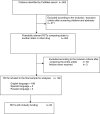Factors associated with findings of published trials of drug-drug comparisons: why some statins appear more efficacious than others
- PMID: 17550302
- PMCID: PMC1885451
- DOI: 10.1371/journal.pmed.0040184
Factors associated with findings of published trials of drug-drug comparisons: why some statins appear more efficacious than others
Abstract
Background: Published pharmaceutical industry-sponsored trials are more likely than non-industry-sponsored trials to report results and conclusions that favor drug over placebo. Little is known about potential biases in drug-drug comparisons. This study examined associations between research funding source, study design characteristics aimed at reducing bias, and other factors that potentially influence results and conclusions in randomized controlled trials (RCTs) of statin-drug comparisons.
Methods and findings: This is a cross-sectional study of 192 published RCTs comparing a statin drug to another statin drug or non-statin drug. Data on concealment of allocation, selection bias, blinding, sample size, disclosed funding source, financial ties of authors, results for primary outcomes, and author conclusions were extracted by two coders (weighted kappa 0.80 to 0.97). Univariate and multivariate logistic regression identified associations between independent variables and favorable results and conclusions. Of the RCTs, 50% (95/192) were funded by industry, and 37% (70/192) did not disclose any funding source. Looking at the totality of available evidence, we found that almost all studies (98%, 189/192) used only surrogate outcome measures. Moreover, study design weaknesses common to published statin-drug comparisons included inadequate blinding, lack of concealment of allocation, poor follow-up, and lack of intention-to-treat analyses. In multivariate analysis of the full sample, trials with adequate blinding were less likely to report results favoring the test drug, and sample size was associated with favorable conclusions when controlling for other factors. In multivariate analysis of industry-funded RCTs, funding from the test drug company was associated with results (odds ratio = 20.16 [95% confidence interval 4.37-92.98], p < 0.001) and conclusions (odds ratio = 34.55 [95% confidence interval 7.09-168.4], p < 0.001) that favor the test drug when controlling for other factors. Studies with adequate blinding were less likely to report statistically significant results favoring the test drug.
Conclusions: RCTs of head-to-head comparisons of statins with other drugs are more likely to report results and conclusions favoring the sponsor's product compared to the comparator drug. This bias in drug-drug comparison trials should be considered when making decisions regarding drug choice.
Conflict of interest statement
References
-
- Bero LA, Rennie D. Influences on the quality of published drug studies. Int J Technol Assess Health Care. 1996;12:209–237. - PubMed
-
- Chan AW, Hrobjartsson A, Haahr MT, Gotzsche PC, Altman DG. Empirical evidence for selective reporting of outcomes in randomized trials: Comparison of protocols to published articles. JAMA. 2004;291:2457–2465. - PubMed


